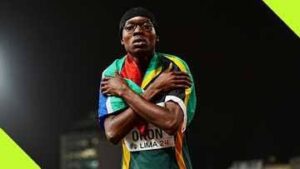A heated debate has ignited on social media after South Africa’s Udeme Okon, a runner with strong Nigerian roots, claimed the gold medal in the 400m final at the 2024 World Athletics U20 Championships in Lima, Peru. Okon’s remarkable comeback in the final stretch, clocking in at 45.69 seconds, has sparked reactions from both South Africans and Nigerians, with many taking to social media to express their opinions on his dual heritage.
The 2024 World Athletics U20 Championships, often referred to by its former title, the World Junior Championships, is a prestigious international competition showcasing the talents of junior athletes. Okon’s victory, shared widely on social media, has brought his dual ties to Nigeria and South Africa to the forefront, igniting conversations that go beyond his athletic achievement.
On his Instagram profile, #udeme_sprints, Okon proudly displays both the Nigerian and South African flags, signifying his deep connections to both countries. This dual nationality has led to a mix of reactions online, with some celebrating the achievement and others questioning his allegiance.
World Athletics also highlighted Okon’s victory with a video post on X (formerly Twitter), stating, “It’s Okon’s moment. Udeme Okon claims the 400m gold with an incredible comeback in the home straight 45.69.” The post quickly garnered attention from users across the globe, particularly in Nigeria and South Africa.
The discussion surrounding Okon’s victory has brought to mind recent tensions between the two nations, notably the controversy involving Miss Chidinma Adetshina. Adetshina, a South African-born model of Nigerian and Mozambican descent, faced intense scrutiny over her eligibility to compete in the Miss South Africa pageant due to her dual citizenship. The backlash, fueled by concerns over xenophobic sentiments, ultimately led Adetshina to withdraw from the competition, citing safety concerns.
Also, read; Nigerian Man Seeks Help After 54-Year-Old Wife Gives Birth to 11 Babies
However, in contrast to the reaction towards Adetshina, the response to Okon’s victory has been more supportive, albeit with some reservations. South Africans and Nigerians have both weighed in on the topic, reflecting a blend of pride and skepticism.
An X user, Tebogo Koma, expressed cautious support, saying, “That name doesn’t sound South African ‘Udeme Okon,’ but if he’s legal, then we fully support him.” Another user, Saint-mykel, humorously added, “Na Akwa Ibom boy be that ooo lol,” referencing Okon’s Nigerian heritage.
Tumishang Mashabela, another X user, raised concerns over identity fraud but ultimately extended congratulations, stating, “No identity fraud, I hope. Nigerian first—proudly South African. Congratulations, young man.” Meanwhile, a user named Azanian Authi hinted at the possibility of Okon’s brother playing for South Africa’s national football team, saying, “His brother Ime Okon will play for Bafana Bafana. Ahh, thank you Naija.”
The support from Nigerians was equally vocal, with Chinonso James tweeting, “I told you, Nigerians are unstoppable, we are everywhere, we make sure we get involved, well done my boy.”
As the discussions continue, Okon’s victory has become more than just a sports achievement; it has highlighted the complex relationships and shared identities between the people of Nigeria and South Africa. While tensions have arisen in the past, this moment also serves as a reminder of the potential for unity and shared pride in individual success, transcending national borders.
